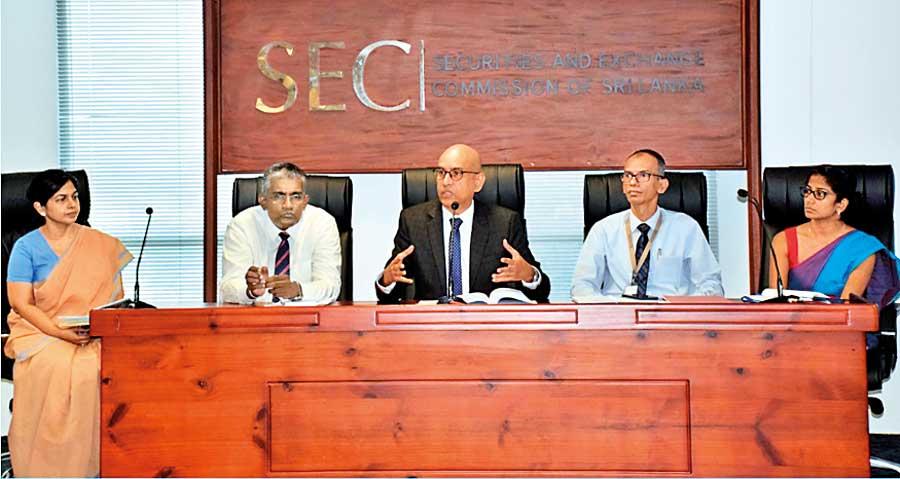Reply To:
Name - Reply Comment

From left: SEC Director Supervision Dilum Mahawatte, Director General Chinthaka Mendis, Chairman Faizal Salieh, Deputy Director General Tushara Jayaratne and CSE Vice President Broker Supervision, Kanishka Munasinghe
As part of their continuing efforts to strengthen market standards and investor confidence, officials of the Securities and Exchange Commission of Sri Lanka (SEC) and the Colombo Stock Exchange (CSE) recently met with Compliance Officers of all categories of market intermediaries. The meeting served as a valuable opportunity to engage in a constructive dialogue on regulatory matters and industry best practices.
Emphasising the importance of the compliance function, the SEC Chairman, Faizal Salieh, stated that the SEC regards the Compliance Officer as a Key Management Person who is empowered to act with independence, authority and responsibility.
The appointment of a Compliance Officer is a prerequisite for granting or renewing licenses to Market Intermediaries and to comply with SEC requirements. Compliance Officers must provide a sworn affidavit declaring their adherence to the fit and proper criteria established by the SEC.
He further stated that, in the event the Compliance Officer resigns, it is imperative that the Market Intermediary must promptly inform the SEC, and select a successor with prior SEC approval. The Chairman stated that the SEC will investigate the reasons behind a resignation, particularly focusing on any internal interferences or influences within the compliance function.
Referring to the regulatory obligations outlined in the SEC Rules applicable to Market Intermediaries, the SEC Chairman asserted that the SEC mandates that Compliance Officers must hold full-time positions due to the substantial responsibilities associated with their role. Speaking on the reporting lines of the Compliance Officer, Salieh, emphasised that the compliance function should be independent of the business operations of the Market Intermediary and all compliance related matters should be reported by the Compliance Officer directly to the Board of Directors or a Board sub-committee dealing with risk, such as the Audit or Risk Committee.
The discussion also focused on the need for all Market Intermediaries to ensure compliance with the SEC Act and the applicable Rules. These Rules mandate the creation of an internal compliance manual for directors and employees, incorporating the specific content outlined in the relevant schedule to the rules.
It was stressed that before developing this manual, Market Intermediaries should have a Board-approved compliance policy to guide the Compliance Officer in implementing the compliance process. The Chairman urged Compliance Officers to ensure that there is a Board-approved compliance policy and discussed key areas within the minimum content of the compliance manual, including conflicts of interest, corporate governance, and risk management with a view to elevating market standards and making the market more attractive to investors.
The Chairman also stressed the need for Compliance Officers to provide prior written approval for all personal account trade transactions of other employees, in order that these transactions do not harm other clients’ interests. Referring to the complaints received by the SEC, the need to have an effective complaint handling mechanism at the Market Intermediary level to proactively address client complaints was also emphasised.
Speaking on the critical role Market Intermediaries play to protect the financial system and the wider community from criminal activities, Salieh stressed the importance of adhering to the regulatory framework set by the Financial Intelligence Unit of Sri Lanka (FIU) with regard to Anti-Money Laundering/Counter Financing of Terrorism (AML/CFT) regulations and Customer Due Diligence (CDD) requirements.